Do you know how to approach your half marathon effectively? Do you find it complicated when you start to plan out your half marathon training plan?
If you have the above questions, you’re in the right place as we have invited 8 experienced half marathoners to share with us their half marathon training plan, and tips and tricks on how to conquer your upcoming half marathon.
What is a marathon?
The marathon is a running event with a distance of 42.195km. Most modern marathons take place in the form of a cross country or on even roads.
The origin of the marathon begins around 490 BC, when the Persians invaded Greece. The most famous legend is that of a Greek messenger: the Pheidippides, who had the duty of telling the peoples of Athens that the Greeks had defeated the Persians in the Battle of Marathon. Pheidippides, who saw the task as important, set out on foot and ran non-stop.
Upon reaching the gates of Athens, he stormed into the government assembly and proclaimed the victory of Greece, where he fell to the ground and died thereafter due to exhaustion.
How is the distance of the marathon derived? The distance between the two cities, Greece and Athens, is approximately 40.8 km along the longest southern route. This was also the route used at the first Olympic Games back in 1896. Since then, the marathon has been part of the Olympics, and it’s also an endurance event to end the games.
What is a half marathon?
The half marathon is a distance of 13.1 miles or 21km. The half marathon is a good goal for runners who have already completed a 5K (3.1 miles) race or a 10K (6.2 miles) race and are looking for a new challenge.
If you can complete a 3 mile race, you can start to train for a half-marathon to test your limits. It might take two to three hours to complete your first half-marathon. The cutoff time to finish a half-marathon is usually set at 3.5 to 4 hours, depending on the race.

How to train for half marathon?
Long Run
Long run can be in a slow and comfortable pace. Long runs play an important role if you are trying to run in your first marathon. You can start your long run a couple of weeks before race day.
Each week, your long run will build your endurance, both in terms of your fitness and preparing your body to withstand 21km of running.
During a 12-20 week half-marathon training period, add a km to your long run every 1-2 weeks, but take a recovery week every 4-6 weeks where the long run distance dips slightly. Run at least 18km during training to ensure you can complete the half marathon comfortably.
You may want to run more than 21km during your peak long run even up to 32km so you can focus on running fast on race day.
Speed Intervals
The reason for using interval training as you train for your half marathon is to get your body used to running faster over longer periods of time or distance.
Start with an easy pace and gradually drop your run pace by 10 to 15 seconds each km. You will want to run a few easy km before and after any speed workout to ensure you have a proper warmup and cooldown.
Tempo Runs
There are a few tips to conquer tempo runs. First, you do not need to rely on your GPS watch to tell you what pace you’re running or you suppose to. This is because they are not 100 percent accurate. Second, during your runs, you can get a sense of how it should feel, you’ll be able to stick to a more even pace come race day.
Strength Training
Adding strength training to your training regime is a benefit to your muscles as it can produce strong and stable foundation of your core muscles. A strong core will help maintain your running form in the final stages of the race when you get tired.
Make sure you include some unilateral exercises into your routine or include lunges and single-leg deadlifts to train your leg muscles. Always remember to do warm-ups and cool downs, so that your muscles would not feel sore.
Nutrition
After your intense run, what you need is to replenish your nutrition. So, carbohydrates are the main focus. Then, you need to intake protein to help repair your muscles and get stronger. Carbohydrates are essential for you to fuel your energy during your training.
There are different variations of fuel you can eat or drink. Some runners prefer sports drinks or gels, which are a convenient way to get some much-needed energy on board. Others prefer ‘real food’ like bananas, dried fruit or chocolate bars. What works for one runner might not be for another runner, so experiment and stick to what you know on the race day.
Rest Days
Always remember to have your rest day as it is crucial in your training plan for your body to recover, rebuild and get stronger. Do remember not to over train to prevent injury.
You need to give time for your body to heal by not overloading or stressing your body out. Do not sweat out on not training during those rest days, your body will thank you if you give your body one or two days off.
Half marathon vs Full marathon
Physical demands
The long runs and distance demands of marathon training, along with the time needed to prepare for the race, take a toll on the runner. A marathoner needs to pay close attention to diet/nutrition, rest/sleep and stress levels in order to remain healthy through the marathon training process.
The half marathon places a lot less demand on the body. So, it is easier to take good care of your body, during half-marathon training, but there’s a lot more room for wiggle. You will recover faster from half a marathon and have less risk of injury due to less wear and tear on your body.
Marathon transition
If you’re a beginner runner and wanted to run a marathon, you can start with a half marathon. A half marathon is a good stepping stone for you and a great way to brace the body for the rigors of marathon training. If you’re a new runner, consider running this year’s half marathon and next year’s marathon.
Half Marathon Training Tips
Let’s take a look on what and how the following 8 runners plan their half marathon.
1. Ruth Ting XianXian
Bio: 23 year-old Malaysian Medical Student (officer cadet)
Ruth came from a family of 8 who are her biggest supporters. Ruth is the third among her 6 siblings. Her siblings are also athletic, so it helps her a lot in working out together and discussing ways to adapt and adopt training programmes. Above all, her parents are always there to provide her the means of exercising.
Currently, Ruth is serving in the army as a medical officer cadet under MINDEF scholarship for Medical Degree. Both of her elder two siblings are also in the medical field working as doctors.
Her 3 younger sisters are still pursuing their tertiary levels in local universities under government scholarships. Since young, they had instilled by their parents about the qualities and values of life, so that they are able to fend for themselves and be independent in the future. Therefore, keep striving and moving forward is her motto of life.

RS: When did you get interested in running half marathons?
Ruth: I started running the half marathon at the age of 18 when I first entered university (UPNM). Back then, I was just an ordinary athlete representing my school in the state level for track and fields.
Little did I know that I would be interested to participate in a longer distance races in the future. UPNM is a very unique university in which, it emphasises on excellence in both academics and military performances for us to graduate as an officer, be it an army, air force or a navy.
Therefore, it introduces many different types of sports into my world. I enrolled myself in the Sports Endurance Club and simply wanted to challenge my body to the next level.
My first HM took place in Bukit Jalil in 2015 and I felt good, even though the timing wasn’t on par with other runners of my age group. That was when I began to develop my interest in long distance races, which requires much endurance. It gives me a brand new type of satisfaction and contentment whenever I conquer another endurance sport.
RS: How do you balance your work life during your half marathon training?
Ruth: Taking up a medical course is no stroll in a park, but that is never an excuse or the reason to stop or skip training.
Currently I’m an athlete on my own, I don’t receive any coaching. However, I do obtain some training programmes online and personalised my own training according to schedule especially during exam seasons. Of course, it has never been easy to juggle in between studies, sports and military performances.
It takes a lot of planning and I would say, wisdom to handle all things at the same time. I always tell myself not to be Jack of all trades master of none.
I always try to balance things out whenever my routine goes a bit into haywire. I do allocate designated time for each and every aspect of my regime but not to the extent of being rigid as my ultimate goal is still to be able to graduate as an army medical officer.
Holding on to that dream, I always put my best effort in every endeavour and make the best out of every chances bestowed upon me.

RS: How do you train for your half marathon?
Ruth: Due to time constraint, I sometimes couldn’t achieve certain targeted mileage within that particular week. Hence, given the time that I have, I would switch more of my training regimes into indoor setting doing HIIT and muscle strengthening in the gym.
As we all know, running doesn’t just revolve around endurance, it absolutely requires a lot of strong core muscles, which include both lower and upper body strength. Interval running on the treadmill is very helpful in improving one’s performance, although it can be very painful at times.
I always make it count whenever I get the opportunity to hit the gym thrice a week, even if it is just for less than an hour. Besides, keeping hydrated and getting enough rest/sleep for recovery is also the 2 very crucial aspects in doing distant running before our body can acclimatise to a higher intensity or longer mileage.
I always try to maintain my body in a good form, even during off season because getting into the best form would be easier for me should I have lesser time for training. Before I sign up for any races, I make sure that I have the minimal adequate time to hone and sharpen my endurance.
RS: Is there any useful technique that you could share with the beginner runners who wish to start their half marathon?
Ruth: I’m not a professional runner. However, in my opinion, I would suggest to those who want to take part in HM to slowly increase your weekly mileage in view of preventing any soft tissue injuries or knee pain.
This is because putting our body into a sudden shock may take its toll on our health in the long run, and you might end up hating this sort of sports even though it brings so much joy and fun to the society. You can always start off with 10km races, gradually increasing it to 12km, 15km and subsequently 17km races.
It is also very important to embrace and enjoy along the journey because racing the entire course with pressure sometimes simply just kills the zeal of running because running has brought so much benefit to our health, mentally, physically and emotionally.
You can follow Ruth Ting on Instagram: @ruthie712
2. Chong Ching Fai, Baldwin
Bio: 31 year-old Singaporean in Sales
“The miracle is that I had the courage to start”. Starting from a boy trying to lose weight and now chasing the dreams of the Boston marathon, running is truly about taking the first step, every day and every run. Currently, Baldwin is a Senior Relationship Manager at Bloomberg HK, covering Hedge Funds, Family Offices and Private Equity clients.
After graduating from NUS where he was part of the NUS Aquathlon and Cross Country teams, he started his career as a Corporate Banker before joining Bloomberg Sales in Singapore and relocating to Hong Kong in 2018.

RS: When did you get interested in running half marathons?
Baldwin: I got hooked into running just like many others after having one too many burgers, I found myself hitting 100kg on the weighing scale instead of my exam scores. So, it began from a humble 10 minute running everyday to 10km.
RS: How do you balance your work life during your half marathon training?
Baldwin: I start work rather early at 8 a.m., so morning runs are next to impossible for me. Most of my runs are done over lunch or in the evening after work (which itself is a challenge after a long day). So it’s mostly out in the hot afternoon sun, treadmills in the gym or evenings out along the river.

RS: How do you plan and train your half marathon?
Baldwin: I’ve never followed much of a strict program after graduation, mainly taking advice and program tips from fellow runners, shout out to The Coney Runners group who often share their training tips, what worked for them and how they structure their key workouts.
- My week is structured with 3 main workouts.
- Monday: Intervals (1k/1mile/2miles) at 10k pace
- Wednesday: Tempo and Long Intervals
- Friday and Saturday: Long Run (with the last 5k at race pace)
- Tuesday, Thursday, Saturday, Sunday: Easy and Cross Training
RS: Is there any useful technique that you could share with beginner runners who wish to start their half marathon?
Baldwin: I’d highly encourage trying to go for a run based on your estimated time, regardless of pace, just to ensure you’re comfortable to last the distance.
Fit in a tempo and interval session instead of just doing long runs at the same pace, those sessions give you the speed you’d need during the race.
3. Anna Eberhardt
Bio: 36 year-old Hungarian, Coaching/ Professional Triathlete and Architect
Anna studied at the Budapest University of Technology and Economics and graduated as an Architect in Hungary.
She is racing as a professional athlete and represent Hungary internationally since 2013. She used to live in Switzerland and she got married to Ralf Eberhardt in 2014. Anna and her husband moved to Singapore 3 years ago and enjoyed an exciting couple of years racing in Asia.
She won the ITU Middle Distance Duathlon Asian Championship in Malaysia 3 times, and is a winner of 70.3 Ironman, and Da Nang-Vietnam.
She also placed 2nd in 70.3 Ironman, Bintan-Indonesia, XiAn-China, a winner in Half-Challenge Triathlon Shepparton-Australia, Nakhon Nanyok-Thailand, and 2nd place in Half-Challenge Triathlon Iskandar Puteri-Malaysia.
Her best half-marathon time (during a Half Distance Triathlon Event) is 1.22.16 and her best 10km time is 36:12. She loves to share her race experience and recently started to coach Triathletes with great success.
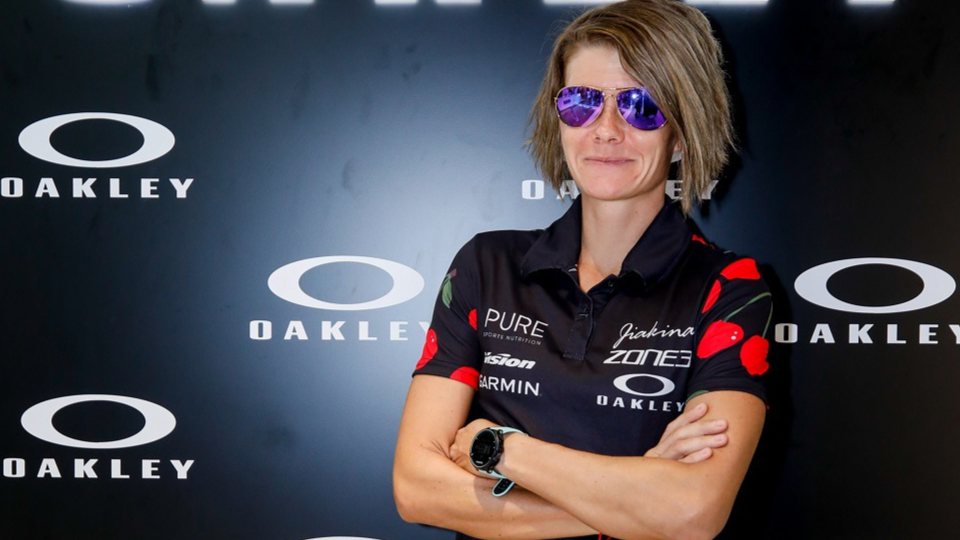
RS: When do you get interested in half marathons?
Anna: I grow up doing any kind of Sports, Triathlons, Duathlons, Cycling, Running. So probably more than 15 years ago I ran my very first Half Marathon. I did join in one of the Running Clubs and enjoyed running with others.
A good company inspires you. I was always about to try to find my boundaries, but don’t forget to have fun and enjoy running.
RS: How do you balance your work life during your half marathon training?
Anna: My advice is that you find a good weekly schedule besides of your work, have fixed appointments which are blocked for your training.
If you are a beginner, don’t hesitate to ask for a help from others, from a running coach. But don’t forget to spend enough time for recovery, eat well, get frequently sport massage.
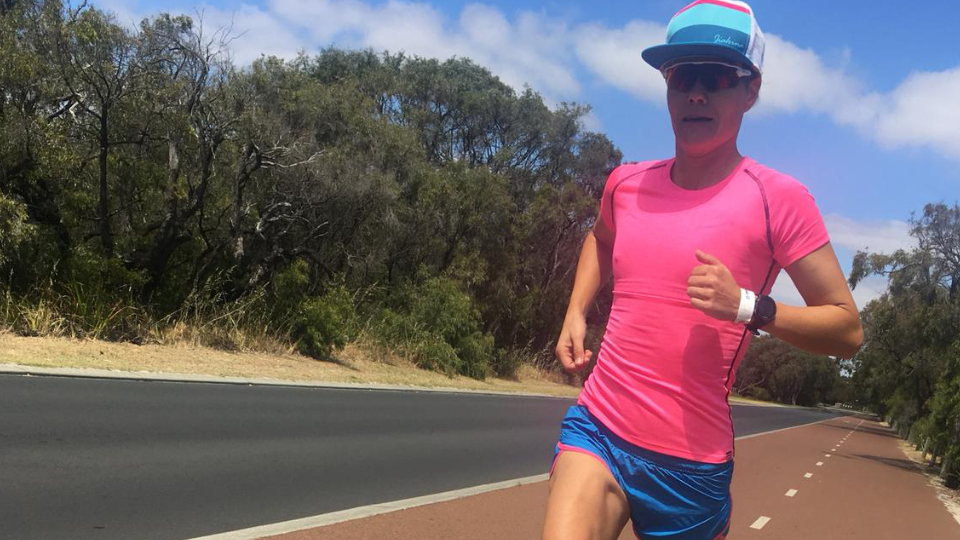
RS: How do you plan and train for your half marathon?
Anna: Since I’m doing Triathlon (swim, bike, run) focused on Half Ironman distances, where you end up running a half marathon after 1.9km swim and 90km bike. I really need to be smart with all my trainings during the week.
A well-structured training schedule helps a lot. It is important is to give your body a rest, don’t push every session. You are only able to develop if you divide which training is a key where you work on speed, which is more for long-basic endurance, which is far longer, race pace specific tempo runs, which is for speed strength workouts (hill reps).
I would recommend finding different terrain for your runs. Trails, running track are healthier for your legs as only running on a concrete surface, which often could cause injuries, knee pain. Hydration is very important, before, during and after training too.
Training for a long distance event requires a kind of periodisation and build the distance over the weeks leading to the event. Like one of the starting weeks:
- Monday: 40 minutes easy jogging + drills, strides at the end
- Tuesday: Track for speed work
- Thursday: Longer tempo runs 10 – 12km
- Saturday: Easy long run
Of course, the program on the day should vary according to the set and adjust week by week. This is the point where you are better to have guidance, a coach who can help.
RS: Is there any useful techniques that you could share with the beginner runner who wish to start their half marathon?
Anna: Able to maintain a good running form is very important, which you can support with strengthen your core and leg muscles.
Once a week, usually I do some running drills, which helps to provide an ideal cadence and stride lengths combination, improve your efficiency, economy. Such as a very basic drills: high knees, butt kick, strides, Carioca and skipping.
You can follow Anna on Instagram: @annaeberhardttri
4. Kenny Putra Tanjaya
Bio: 34 year-old Indonesian, Entrepreneur
As a small town boy who grew up overseas, Kenny loves soccer and running.
He is willing to do wonders to inspire others to live a healthy lifestyle through running. Running has saved Kenny’s life. In life, he hopes to inspire others through running because running has taught him a lot about self dedication, self discipline, self esteem and loving himself before loving others.
The greatest achievement of running is that he had found a way back to forgive and learn from the past. Now, Kenny has managed to influence his family and the mother of his child to start actively run in small races with him.
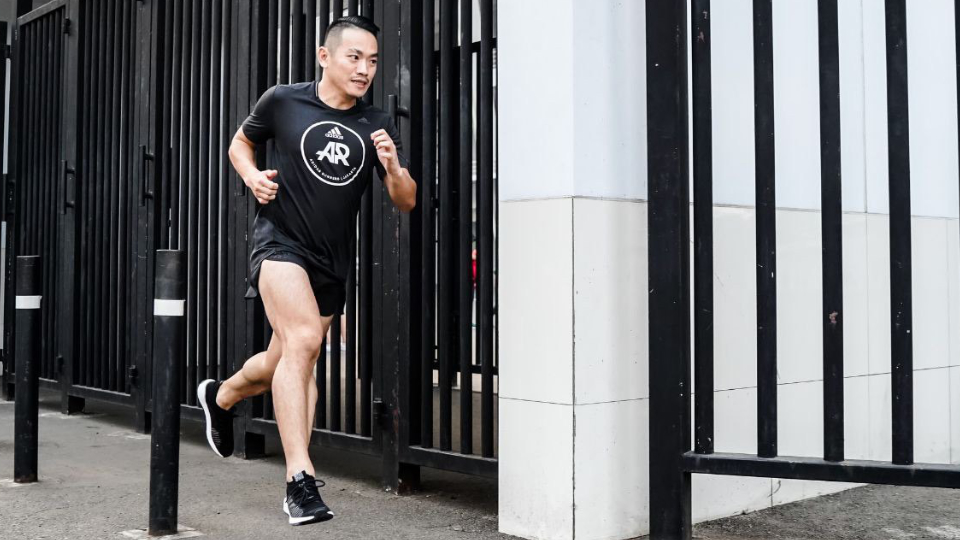
RS: When do you get interested in half marathons?
Kenny: Since July 2015, trying to survive the biggest calamity of my life. I fell into depression and at first running was just a way for me to escape that excruciating pain and loneliness.
But as time passed, I started to meet new people in the running community and some of them really contributed some positive vibes and energy.
Therefore, from running without purpose, I began to fall in love in running and eventually find myself again. My first HM was in “Run For River Half Marathon” in University Indonesia, Depok and my time was 2:05:10.
RS: How do you balance your work life during your half marathon training?
Kenny: I created a new habit of waking up early to do my training. I wake up at 4:30 a.m. everyday, made myself a cup of coffee while listening to good music, while reading the morning news.
Fortunately, my apartment is close to a sports stadium. I start running at 5:45 a.m., 3 days a week. Normally, I work at 10 a.m. to 6 p.m..
Most importantly, I would not be bringing my work to home. I eat on time most times and have developed a good balanced diet for my marathon training clean and healthy eating play a vital role in your everyday life.
I will be in bed by 9:30 p.m. most nights. When you have a good work life balance, you’ll feel happy after your run because today is better than yesterday.
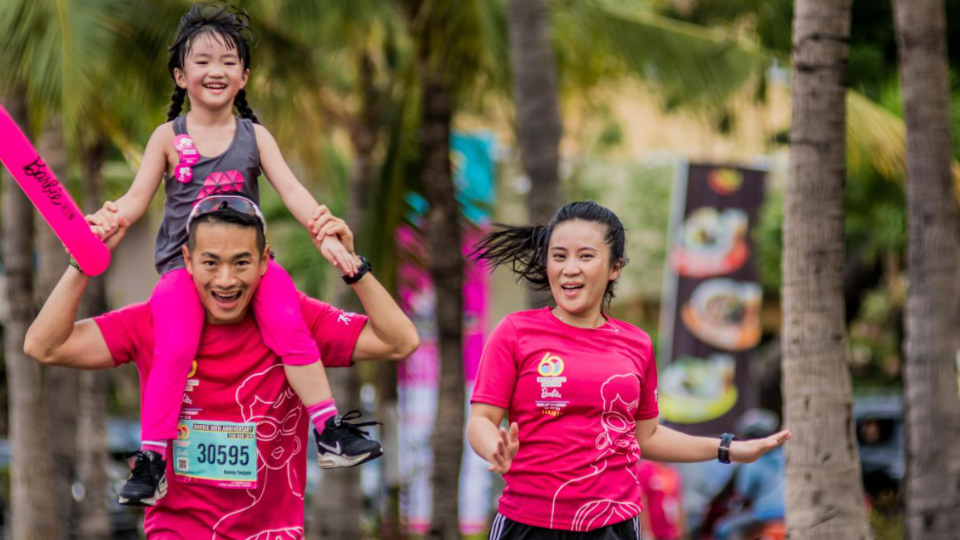
RS: How do you plan and train for your half marathon?
Kenny: My training plan consists of:
- Easy Run / Jogging (2x a week)
- Intervals (once a week)
- Tempo (Once a week)
- Long Run (Once a week)
- Strength and Core Training (Once a week)
RS: Is there any useful technique that you could share with beginner runners who wish to start their half marathon?
Kenny: To start with:
You have to build your running base with HR in zone 2-3 times for 4-6 weeks.
- Running drills
Do it 3 times a week before your morning run. Drills help to improve and strengthen both of your muscle & joints. It also improves coordination & balance to help us become a better runner. My own achievement and result from doing drills consistently, it has improved and beautify my running form & also improve my stride length and cadence.
- Intense training
Make sure by the end of week 8, you’d have a solid running based before entering intervals & tempo run.
- Strength Training
Strength training is an essential supplement to a runner’s roadwork because it strengthens muscles and joints, which can improve race time and decrease injury risk.
You can follow Kenny on Instagram: @kenny_tan168
5. Muhammad Syafiq Bin Mohammed Faruq
Bio: 23 year-old Singaporean, Full Time National Service with Singapore Police Force
Syafiq loved running since primary school where he discovered that he had the stamina when he played catch with his schoolmates.
Through the catch game, he realised he was able to run well. He enjoys being physically active daily and was always a restless student in class.
He runs to release his stress as well, and the endorphins rush felt good for him. However, he started competitive running late compared to his peers, Syafiq had his first coach and a structured training programme in tertiary education when he was 17 years old.
He was always compared as a slow runner, but he was always determined to improve himself further and push him to the limits.
Since then, he has been running competitively for 6.5 years and he loves staying disciplined and having a structure in his life, which moulds him into a better person.
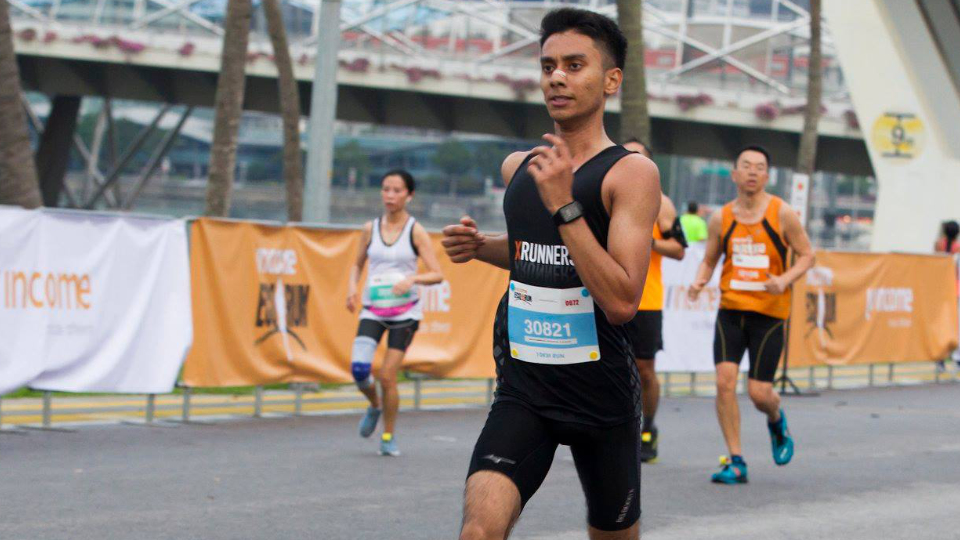
RS: When do you get interested in running half marathons?
Syafiq: It is a manageable distance whereby it is a stepping stone to the full marathon. The results of the half marathon can be roughly gauged for the full marathon.
Running a half marathon is a respectable distance as it requires an amount of physical fitness as well as the mental aspects such as discipline.
It started back in 2014 where I ran my first Sundown Half Marathon. I was progressing the distance from a 10km to a 21.1km where I wanted to push beyond my limits.
RS: How do you balance your life during your half marathon training?
Syafiq: I will plan and organise my time in advance. Time management and priorities are really important for success.
Most days I train in the late evening after work at 6:40 p.m. to 8:40 p.m.. On my off days I will run in the morning at 6:45 a.m. to 8:45 a.m..
Each session contains a proper warm up and cool down session. I will never jump straight into a workout without a proper warm up. This is to avoid getting injuries.
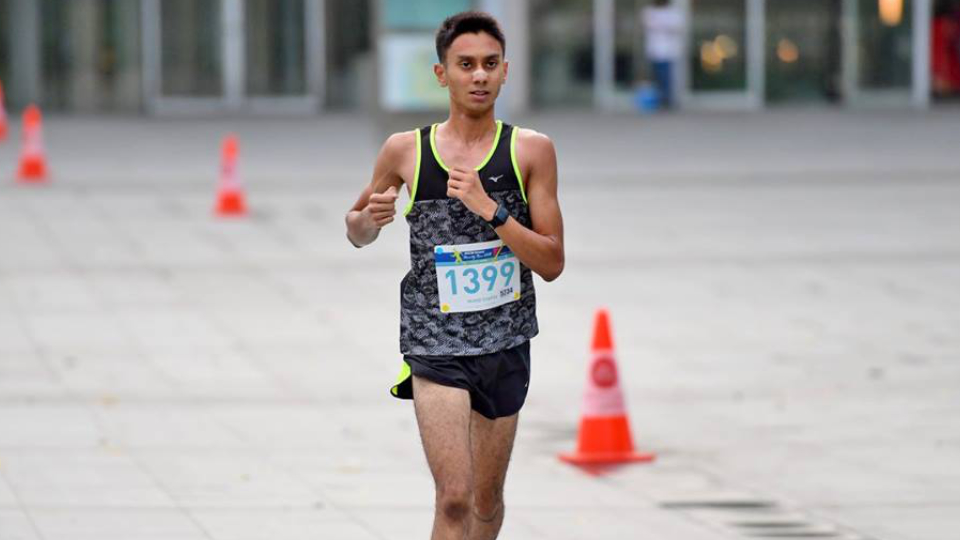
RS: How do you train for your half marathon?
Syafiq: I usually have a consistent mileage throughout weekly. I train 7 days in a week, whereby different days are different training sessions which consist of Long Runs, Easy Runs, Speed Workouts, Strength & Conditioning and Yoga.
I will run on different kind of terrains such as gravel, trails and grass which gives less stress and less impact on the joints. I will taper down 2 weeks before the race day and will avoid weights during this period.
I do eat nutritious food such as whole grains, lean protein and good fats. Not forgetting the daily servings of fruits and vegetables as well. It is best to avoid junk or fast food. The body needs nutrients, not junk.
RS: Is there any useful technique that you could share with new runners who wish to start their half marathon?
Syafiq: Start slow and easy, do easy runs that will add up to the mileage and include a long run in a week as it will help in conditioning the body.
The body improves progressively, hence do not jump straight into a high mileage. It takes a few weeks for the body to adjust to the stress. A good 3 months of training are decent enough to prepare for a half marathon.
On the race day, I will take my first half (10.5km) as an easy, comfortable run and the second half will be a faster pace. Psychologically, you will feel less pressured with the distance.
You may want to invest in a GPS running watch to keep track of the distance during the race. Remember to rest daily, especially after a workout because the body needs to recover and adapt to the training stimulus.
It is recommended to sleep at least 8 hours in a day to avoid being lethargic and avoid getting injured. Most importantly enjoy the process of training and have fun on the race day.
You can follow Syafiq on Instagram: @_syafiq_faruq
6. Ang Xinyao Desmond
Bio: 29 year-old Singaporean, HR Professional
Desmond is an avid distance runner who loves competing in various distances, more likely so in the 10 km. This is mainly due to the local running landscape, where the 10 km distance is the most common competitive distance around.
However, recently he has ventured into the half-marathon, a distance that he is starting to enjoy competing in.

RS: When do you get interested in running half marathons?
Desmond: “The only limits to the possibilities in your life tomorrow are the buts you use today” – Les Brown.
About 3-4 years ago, intrigued at how would I perform at a distance twice that I am comfortable with. It is done mainly to challenge myself, to test my physical and mental limits.
It is also a distance where we can still go fast enough to feel like it’s a race, but slow enough to enjoy the scenery. The training for it is rather tough though, a different kind of tough for the 5km and 10km.
RS: How do you balance your work life during your half marathon training?
Desmond: “Life is like riding a bicycle. To keep your balance, you must keep moving.” – Albert Einstein.
I set both long-term and short-term goals, but they are also on my own terms. This way, my goals and more profound and personal, and it sticks.
Secondly, I know the ideal situation of balance, and the current situation (yes, the reality), and work to address these gaps. Some of the ways I try to close the gaps are: More sleep, time my rundown, has contingency plans.
And also forgive yourself, if some workouts need to be skipped or altered accordingly. What I find critical for my spiritual well-being is to hang out with friends and eat what you like!
Asynchrony of not beating myself up and doing my best in a sustainable way in an array of scenarios really works for me. But the general rule of thumb is to keep showing up, and keep moving to keep that balance (Y).
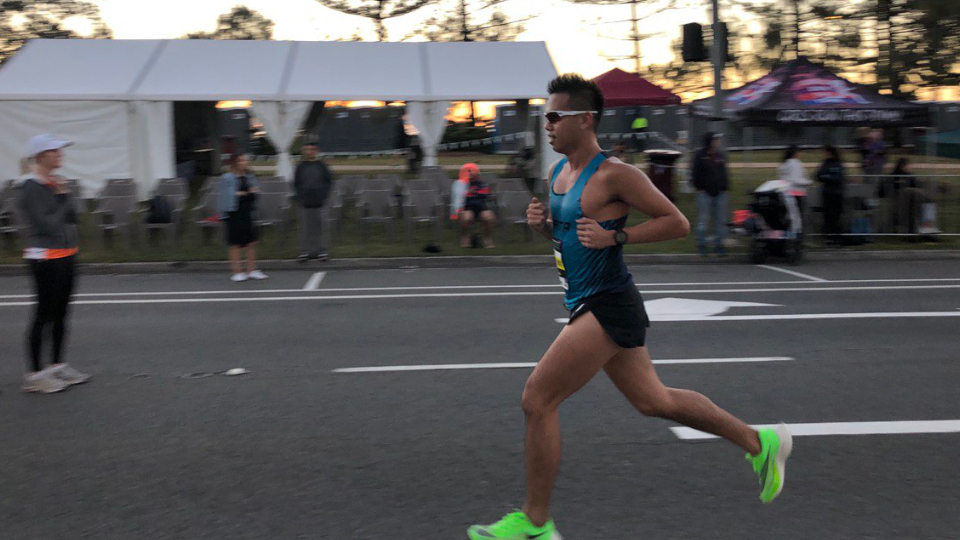
RS: How do you train for your half marathon?
Desmond: “A goal without a plan is just a wish” – Antoine de Saint-Exupery.
Trackstar athletics plan my training periodisation, so my job is to be as consistent as I can. Generally, I run 5-6 times a week of varying distances and varying effort.
It can consist of a mix of easy runs, long runs, tempo runs, fartleks and/or interval runs. Being in a group setting also helps, and I am lucky to surround myself with training partners with a Champion’s mindset.
- Monday: Rest/ Fartleks
- Tuesday: Long Run
- Wednesday: Intervals
- Thursday: Rest
- Friday: Tempo Run
- Saturday: Long Run
- Sunday: Long Run
RS: Is there any useful technique that you could share to new runners who wish to start their half marathon?
Desmond: Do the 5km and 10kms first! If you are already a seasoned runner, then in general, it will consist of long run sessions: longer intervals, longer runs for instance.
Leading up to the race, you may wish to have a few leads up races of shorter distances. For race-day, you should feel good up to halfway of the race if possible, and plan your hydration by studying the race guide!
For the road races in Singapore, I’ve noticed that many times, distances are shorter (e.g. 20.8km). Do not be frustrated though, do a simple pro-ration for an estimated time.
Then, gun for a better timing (or estimated timing) the next run, for there’ll always be room for improvement!
You can follow Desmond on Instagram: @unbelievaboy
7. Loh Chooi Fern
Bio: 27 year-old Malaysian, Accountant Crowe
Chooi Fern started to play sports during her university year. She has been active in race walking event for 5 years and just switched to marathon event for 3.5 years.

RS: When do you get interested in running half marathons?
Chooi Fern: I started to pick up running 3 years back, my main objective to join half marathon is to challenge myself in running.
RS: How do you balance your work life during your half marathon training?
Chooi Fern: I will train before I enter into my office. I feel more energetic after exercise in the morning thereafter I am more productive in my workplace.
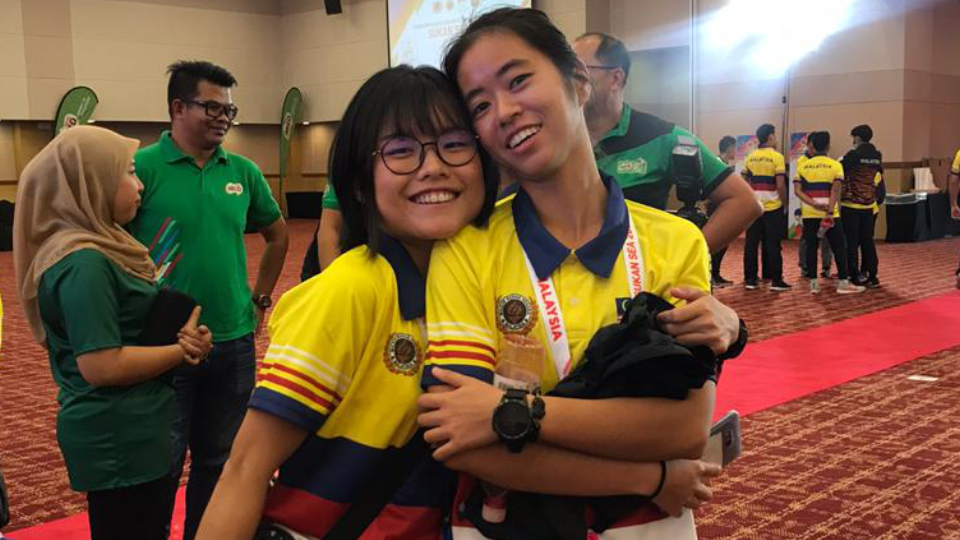
RS: How do you train for your half marathon training?
Chooi Fern: Normally, I use one month to prepare my half marathon, the useful way to have at least 6-8 quality sessions in the preparation. These quality sessions can be long run or tempo.
- Week 1 – Build Foundation
Target more in slow pace running to build the foundation.
- Week 2 – Strength with a long run in order to improve the run technique
Not more than an hour run with a faster pace as compared to week 1 and do more on short speed.
- Week 3 – Focus more on tempo
- Week 4 -Tapering down. Less running, with more resting
RS: Is there any useful technique that you could share with new runners who wish to start their half marathon?
Chooi Fern: For a beginner, I would like to suggest them to take up more long easy runs to help them to build a stronger foundation.
You can follow Chooi Fern on Instagram: @chooifernpenny/
8. Katherine Lim
Bio: Singaporean, Digital Marketing Manager
Katherine has been running for 8 years. She started running to relieve stress and to lose some weights. Now she has completed numerous marathons and ultra marathons.

RS: When do you get interested in running half marathons?
Katherine: I started running after moving near to east coast park. My evening strolls progressed to easy jog and to run.
Running is the best stress reliever. It takes your mind off other things. I love the positivity in the running community.
After running a couple of 10km races, I thought it would be cool to sign up for a Half Marathon race to challenge myself. Like what the saying goes, the rest was history.
RS: How do you balance your work life during your half marathon training?
Katherine: It’s all about time management and commitment. Running 3x a week after work and/or during the weekend is very manageable.
Start with short runs and slowly improved to longer runs. Most of my long runs are done on weekends. In fact, research has shown that most runners perform better at work.
The more positive outlooks helped them to perform their daily tasks better.

RS: How do you train for your half marathon?
Katherine: Generally, I incorporate some hard and easy runs in my training to prepare for a half marathon. There are many different plans available online.
A sample of my training plan could be:
- Monday: Swim/Yoga
- Tuesday: Hill runs/Fartlek
- Wednesday: Rest
- Thursday: Tempo run
- Friday: Rest
- Saturday: Long slow run
- Sunday: Rest or cross train
Please find a program which suits your fitness and time.
RS: Is there any useful technique that you could share to new runners who wish to start their half marathon?
- Do not rush into it. Start slow and with fewer kilometres. Increase pace and distance gradually. The rule of increasing not more than 10% total per week is helpful.
- Perform dynamic warm up such as leg swing, jumping jacks before each run , especially important if you plan to go for a run
- Stretch and foam roll the tight muscles after a run.
- Do not compare with others. We are all made differently. Challenge yourself and inspire people around you.
- Incorporate cross training such as swimming, gym work to stretch, strengthen and balance up the muscles on non running days.
You can follow Katerine Instagram: @runeatkat
More on running a half marathon
Should you run 13 miles before a half marathon?
It’s not necessary to run 13.1 miles before a half marathon race. If you can run or run/walk 10 miles, you should be able to safely and comfortably complete a half marathon. Some runners participate in long runs totalling 13 miles or more to better prepare themselves for the race.
What is the average half marathon time?
The average half marathon finish time is 2:05 for males. For females, the average half marathon finish time is 2:24. The average half marathon time for athletes/elites is 1:10-1:30.
How many kilometres a week should I run for a half marathon?
When training for a half marathon, it’s best to gradually increase your mileage (about 10 percent each week) over a 12- to 14-week period. Your goal is to cover 32 to 48 kilometres each week.
How much rest do I need after a half marathon?
If you finished your half marathon in 90 minutes or less, you can resume running after just 2-4 days off. If your finish time was more than two hours, you may need up to a week off of running to recover as the total time on your feet is a significant factor in how long you need to recover.
If you want to run a half marathon, start now. Don’t spend the rest of your life wondering if you could do it.
Have you came across any half marathon training plan that you think is useful for new runners? Do share them in the comments below.





